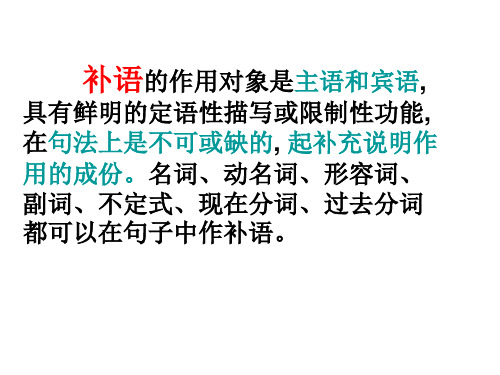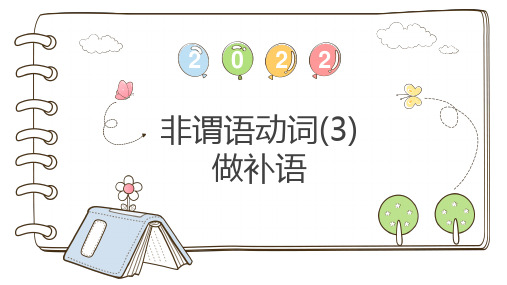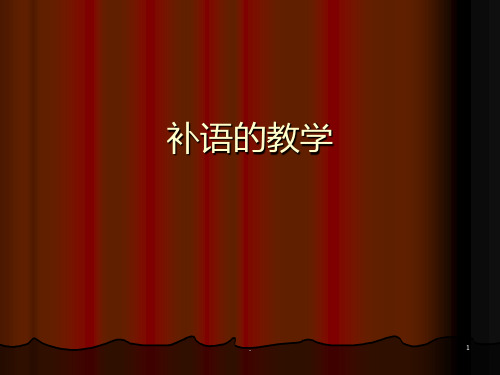高中英语语法——补语 (共18张PPT)
(完整版)宾语补足语课件

有
have sth to do /to be done
• 1. I have a lot of work to __d_e_a_l _ (deal) with. 自己做
• 2 ‘Do you have any clothes
_t_o_b_e__w_a_s_h_e_d__( wash) ?’ Mon asked me
had had _____ went wrong again
A. it
B. it repaired
C. repaired
D. to be repaired
3.I have had my bike _____, and I’m going to have somebody _____ my radio tomorrow.
when she came to see me every weekend.
别人做
-Good morning. Can I help you?
-I’d like to have the package ____, madam.
A. be weighed C. to weigh
B. to be weighed D. weighed
➢He likes sleeping with lights on.
➢With so many people working, the family has a large income.
➢With Tom to help me, I can finish the task in time.
➢The murderer was brought in, with his hands tied behind. ➢The teacher came in, with a book in his hand.
高中英语语法——补语 (共18张PPT)

3. 不定式(to do) The teacher don’t allow us to play football on the
street. We made him copy the sentence. (使役动词省to)
4. 现在分词(-ing) I found Tom lying in the bed. We hear him singing in the hall.
5. 过去分词(-ed) He saw his face reflected in the water. I heard it spoken of in the next room.
Attention :非谓语充当补语
一.带to的不定式( to do ) 作宾补的动词常见的 有:ask, invite, tell, want, encourage, wish, expect, beg, request, require, advise, order, force, cause, allow, permit, forbid, warn, remind, teach, send, call on, wait for, would like / love / prefer 等表示劝请、要求类动词后,用带to的不定式 作宾补。
would like to see carried out the next year.
四. want, get, have宾语后可接现在分词、过去分 词或动词不定式,但意义不同。
①want sb. doing希望某人做某事(多用于否定); want sb. to do要某人做某事; want sth. done=want sth. to be done(被动)。
不定式不带to,但在其被动式后作主语补足语
高中英语语法——过去分词作宾语补足语(39张PPT)

各个击破
• 下列各句均有一处错误,请指Fra bibliotek并改正。•1. I found the game execxicteidti.ng
•2. We usually work only five hours a day, so we have plenty of spare time visit the area and have
•今 天 ,我 有 幸 参加了 学校“ 法制教 育进课 堂”教 育培训 。通过 培训,本 人有一 点粗 浅 的 感 悟 ,现 写出来 让同行 共免。
•一 、 感 悟 收 获
•戴 主 任 告 诉 我们,“法 制教 育进课 堂”是 高港区 “六五 ”普法 的品牌 项目,市、区领 导 很 重 视 ,符 合区政 府“平 安高港 ”、“ 法治高 港”建 设的决 策部署 。按照 法制宣 传 教 育 从 娃 娃抓起 的基本 要求,突 出“法 制教育 进课堂 ”主题 ,不断提高在校学生法 制 宣 传 教 育 工作的 针对性 、主动 性和实 效性,使 之形成 制度化 、规范 化、科 学化、 常 态 化 ,奋 力 开创我 区在校 学生法 制宣传 教育工 作的新 局面。 由此,我体会到了法制 教 育 在 学 科 教育中 所占的 分量将 越来越 重,也要 求我们 教师对 此应高 度的重 视。同 时 我 也 深 刻 地认识 到了当 今法制 教育刻 不容缓 ,明白了 教师不 仅教书 ,还要育人的道
1. Laws that punish parents for their
little children’s actions against the laws get parents __A____.
A. worried
B. to worry
C. worrying
英语语法:定语、状语、补语(课堂)-2023年学习资料

形容词性物主代词作定语-What's your name,please?-请问你叫什么名字?-Whose icture is it?-这是谁的画?-This is my bag-这是我的包。
数词作定语-We have four lessons in the morning.-我们上午上四节课。ainan is the second largest island of-China.-海南是中国第二大 岛。-There are four apples on the table.-桌子上有四个苹果。-5
不定式短语作定语-不定式的基本形式:o+动词原形。-I have nothing to worry abo t.-我没什么好担忧的。-He gave me some books to read-他给我一些书看。-注 不定式不能做谓语。
不定式作定语-Do you have anything more to say?-你还有什么话要说吗?-T ere is nothing to worry about-没什么好担心的。-I have a lot o homework to do.-我有很多作业要做。-8
分词作定语-Barking dogs seldom bite.-爱叫的狗少咬人。-Polluted air is harmful to people's health.-污染的空气对健康有害。-This is on of the houses built last year.-这是去年建造的房子中的一座。-9
介词短语作状语-At present about 38%of the Chinese-population smoke.目前中国大约有-38%的人吸烟。-To his surprise,she criticized him instead-of praising him.使他吃惊的是,她不仅-没有表扬他反而批评了他。-I ll be back in two hours.我两小时内赶-回来。-13
英语语法:定语、状语、补语ppt课件

可编辑课件PPT
6
不定式短语作定语
不定式 不定式的基本形式:to+动词原形。 I have nothing to worry about. 我没什么好担忧的。
He gave me some books to read. 他给我一些书看。 注:不定式不能做谓语。
可编辑课件PPT
7
不定式作定语
Do you have anything more to say? 你还有什么话要说吗? There is nothing to worry about. 没什么好担心的。 I have a lot of homework to do. 我有很多作业要做。
可编辑课件PPT
9
句子作定语
句子作定语即是定语从句 She has found the necklace that she lost
two weeks ago. 她找到了两年前丢的项链。 It happened at the time when I left the
office. 这事就发生在我离开办公室之时。
可编辑课件PPT
10
状语
状语用来修饰动词、形容词或副词。 表示行为发生的时间、地点、目的、 方式、程度等。可作状语的有:副词、 介词短语、不定式、分词、形容词、 词组、复合结构、从句。
可编辑课件PPT
11
副词作状语
Speak politely.说话要有礼貌。 It is very nice of you.你真好。 Read loudly.大声读。
定语、状语、补语
定语
用来修饰名词或代词,可分为前置定 语和后置定语。一般由形容词、形容 词性物主代词(my、his、your、her 等)、数词、介词短语、不定式短语、 分词或句子充当。
2019年高中英语语法 宾语补足语(共40张PPT)

2.I find it _d_if_f_ic_u_l_t to raise the money. (adj.) 3.I’ll ask her _o_u_t tomorrow evening. (adv.)
They saw the Emperor walking in the street .
感官动词, 所接的宾补可以是v-ing形 式,也可以是动词原形。
feel, hear, listen to, notice, observe, see,
watch, look at
1. I saw him c_r_o_s_s_/c_r_o_s_s_in_g_ (cross) the
6.She is going to have the p.) 7.His speech left the president_in__a_n_
_a_w_k_w__a_r_d_s_i_tu_a_t_i_o_n. (prep. phr.)
He had wardrobes and cupboards full of clothes .
Grammar and usage
英语的五个基本句型结构:
S十V
主谓结构
He runs quickly.
S十V十P
主系表结构
The story sounds interesting.
S十V十O
主谓宾结构
They built a house last year.
S 十 V 十 O1 十 O2 主谓双宾结构
含使动意义的动词, 所接的宾补多为动词 原形或过去分词。
高一英语宾语补足语 PPT课件 图文

• 1.What he had said made me ________. (surprise)
• 2.There was a terrible noise _______ the sudden burst of light. (follow)
• 4.My glasses are broken. I’ll have to get them ________.(repair)
• 5.With her finger __________ to the broken vase, my mother asked me, “Who did that?” (point)
• 6.The doctor warned him ________ food only after the operation. (not eat)
• A.understand; understand B. understand; understood
• C. to understand; understand D. understand; to be understood
• 9. The girl asked him not to leave the door _____.
B. being sung; sang
• C. sung; sing
D. sang; singing
The End
谢谢! 学妹给我打电话,说她又换工作了,这次是销售。电话里,她絮絮叨叨说着一年多来工作上的不如意,她说工作一点都不开心,找不到半点成就感。 末了,她问我:学姐,为什么想 找一份 自己热 爱的工 作这么 难呢? 我问她上一份工作干了多久,她 说不到 三个月 ,做的 还是行 政助理 的工作 ,工作 内容枯 燥乏味 不说, 还特别 容易得 罪人, 实在不 是
初高中英语衔接非谓语动词做补语课件

特警名言句子1. 特警力量中的一些名言警句1.奇迹,是留给那些坚持不放弃的人的!2.他沈鸿飞比段卫兵要冷静的多,他知道自己不能成为异类。
一个团队不是每个人的选择都是正确的,他在照顾整个团队的情绪。
!所以,他沈鸿飞,是整个团队的领导者!3.哪有那么多去对的地方,既然来了,就什么都不要想!4.那个时候,我们都太年轻,太骄傲,不懂得欣赏对方的好!5.我们会带着他们的生命,去战斗,去牺牲,绝不后退!6.遇到你这么个搭档,真是我的冤家。
7.真帅啊花痴!8.不要爱上突击队员。
9.当一个城市发生最危险案件的时候,需要的是我们特警! 10.我们是这个城市,最后一道屏障。
11.这个队将会是突击队当中的突击队,精锐当中的精锐。
12.我要去特警队,我想当特警。
13.我时时刻刻准备着,从小就准备着。
14.在荣誉墙上,有太多我认识的名字,我不希望你们是下一个。
15.真正的特警,特别能吃苦,特别能战斗,特别能忍耐,特别能奉献。
16.你们会退却吗永不退却!17.那时候我们都太年轻,太骄傲。
18.等你把莎莎救出来的时候,我会说谢谢你。
19.莎莎的命就是我的命。
20.最危险的时候,我们一家人要在一起2. 三十条警察名言警句001业精于勤,荒于嬉,行成于思,毁于随002黑发不知勤学早,白首方悔读书迟003吾生也有涯,而知也无涯004 日子象念珠一样,一天接着一天滑过,串成周,串成月005 年华一去不复返,事业放弃在难成006 黄金时代是在我们的前面,而不在我们的后面007 时间是脑力劳动者的资本008 文学之知识乃是学问之门禁009 天才无非是长久的忍耐,努力吧!010 知识象烛光,能照亮一个人,也能照亮无数人011 读万卷书,行万里路012 知识永远战胜愚昧013 黑发不知勤学早,白首方悔读书迟014 如果不想在世界上虚度一生,那就要学习一辈子015 书籍是横渡时间大海的航船016 一分耕耘,一分收获;要收获的好,必须耕耘的好017 学问二字,须要拆开看,学是学,问是问018 光阴易逝,岂容我待019 人生有一道难题,那就是如何使一寸光阴等于一寸生命020 忘记今天的人将被明天忘记021 你若需要时间,还得自己把他造出来022 时间是没有声音的锉刀023 时间是一味能治百病的良药024 人若是把一生的光阴虚度,便是抛下黄金未买一物025 时间是一笔贷款,即使在守信用的借贷者也还不起026 庸人费心将是消磨时光,能人费尽心计利用时间027 不要为已消逝之年华叹息,须正视欲匆匆溜走的时光028 向今天献出自己的人,没有哪一个昨天是给浪费掉的029 对活者的人来说,是没有明天的;死了的人则没有今天030 抓住今天,尽可能少的信赖明天031 岁月是百代的过客,而逝去的年华也是旅客032 对时间的价值没有没有深切认识的人,决不会坚韧勤勉033 除了时间,什么也不属于我034 浪费时间是一桩大罪过035 把握时间观念,同认识一个人一样,相见易,相识难036 人生最大的幸福,莫过于连一分钟都无法休息037 零碎的时间实在可以成就大事业038 浪费了一生就等于夭折039 珍惜时间可以使生命变的更有价值040 时间象奔腾澎湃的急湍,它一去无返,毫不流连041 一个人越知道时间的价值,就越感到失时的痛苦042 得到时间,就是得到一切043 用经济学的眼光来看,时间就是一种财富044 时间一点一滴凋谢,犹如蜡烛漫漫燃尽045 我总是感觉到时间的巨轮在我背后奔驰,日益迫近046 夜晚给老人带来平静,给年轻人带来希望047 不浪费时间,每时每刻都做些有用的事,戒掉一切不必要的行为048 时间乃是万物中最宝贵的东西,但如果浪费了,那就是最大的浪费049 我的产业多么美,多么广,多么宽,时间是我的财产,我的田地是时间050 时间就是性命,无端的空耗别人的时间,其实无异于谋财害命3. 关于警察的名言1、不要过分相信除你之外的任何人。
高三英语语法宾语补足语的用法课件

一、可以充当宾语补足语的词和词组有: 可以充当宾语补足语的词和词组有:
4、动词不定式: 动词不定式: Nobody could make him change his mind. mind. Would you like me to come along with you? He believed the earth to be a globe. globe. 5、过去分词: 过去分词: He watched the TV set carried out of the room. room. Last year they had their house rebuilt. rebuilt. When you speak English, be sure to make yourself understood. understood. 6.此外,副词和介词短语也可以充当宾语补足语,如: 此外,副词和介词短语也可以充当宾语补足语, When do you want it back? Why didn’t you invite them in? We could hear the children at play outside. outside.
二、宾语和其补足语之间的逻辑关系: 宾语和其补足语之间的逻辑关系:
1、 当名词 、形容词 、 副词和介词短语充当宾语补足语时 , 它们和 当名词、形容词、副词和介词短语充当宾语补足语时, 宾语之间有着逻辑上的主谓关系(或称表语关系) 宾语之间有着逻辑上的主谓关系(或称表语关系),若无宾语补足 则句意不完整。宾语补足语说明宾语的情况、性质、特征、 语,则句意不完整。宾语补足语说明宾语的情况、性质、特征、状 身份或属类等。试比较: 态、身份或属类等。试比较: We made him our monitor. (He is our monitor.) monitor. monitor. You should keep your room clean and tidy. (Your room is clean tidy. and tidy.) tidy. We could hear the children at play outside. (The children are at outside. play outside.) outside.
补语的教学PPT课件

拿一本书上来 叫一辆车进来 请一个人出来
这种结构表示未实现的命题,所以常常用作祈使句,请别人
或者命令别人做什么事情。
这个宾语位置上一定不可以出现处所宾语。
2、动词+ “上、下、进、出、回、过、起”+宾语+“来/ 去”
这个宾语位置上,可以是处所宾语,也可以是非处所宾语
拿出一本书来 走出一个人来 开进一辆车来 想起一件事来
爬上山来 开进学校来 走进门来 走出门去
3、动词+复合趋向动词+宾语.
13
(四)、趋向补语的偏误分析
1、关于“立足点”问题
一般来说,“来”“去”的立足点应该是说话人所在的位置。 当动
作的趋向朝着说话人所在的位置时,就用“来”;当动作的 趋
向背离说话人所在的位置时,就用“去”。有时候 “来”“去”自
动词+来/去、上、下、进、出、回、过、起 简
单趋向补语
动词+上/下、进、出、回、过、起 +来/去 复合 趋向补语 以上两类趋向补语除趋向意义外的用法 都叫做趋向补语的引申用法。
.
7
(二)、趋向补语的引申用法
1、上 A表示由开而合
关上窗户 闭上嘴巴 B 表示动作开始并继续的意义 家里来客人,她又忙上了。 他在那里又跟人聊上了。 他爱上那个女孩子了。 C 表示添加 算上我一个 D 表示达到目的 被选上了 住上了新房子 赶上张丽 E 达到一定数量 住上三个月 写上三百字 F 表示附着、存在 种上很多花 贴上邮票 插上山顶 好上一
共现。
.
12
拿一本书下楼 带一些水果上山 背一些书进教室
3、如果是一部分趋向动词,如“上、下、进、出、回、过、
起”等充当了主要动词,“来”“去”做趋向补语时,处所 宾语的
位置也要位于动词和趋向补语之间。如:
2020高考英语复习宾语补足语教学课件 (共17张PPT)

9.Tell him not to shut (shut) the window.
10. I could not do my homework with all that noise going on (go on ) .
.
12
单句改错
1. The speaker raised his voice but still couldn't make himself understand. understood
putting
8. With a lot of difficult problems settle, the newly-elected president is having a
hard time.
to
9. When I came in, I found a boy hide behind the door. hiding
I would prefer you not to change your plan . 3
宾语补足语
The headmaster warned the children to keep off the garden . They encouraged me to try again . 2. 某些动词如 think , consider , believe , know , find 等后面做宾 语补足语的不定式常用to be +ddj .结构。
5. Don't leave the water run while you brush your teeth. running
13
单句改错
6. He pushed the door opening.
open 7. She looked around and caught a man put his hand into the pocket of a passenger.
英语语法:定语、状语、补语(课堂)_2022年学习资料

分词短语作状语-Working in this way,they greatly cut the-cost 用这种方法,他们大大地降低了-成本。-Compared to many women,she is inde d-very fortunate.和很多妇女相比,她的-确很幸运。-15
形容词作状语-He spent seven days in the wind and-snow,cold nd hungry.他在风雪中过了-七天,又冷又饿。-Tired and hungry,he arrive home.他到-家了,又累又饿。-Afraid of the dogs,she entered by t e-back door.由于怕狗,她从后门进去。-16
不定式短语作定语-不定式的基本形式:o+动词原形。-I have nothing to worry abo t.-我没什么好担忧的。-He gave me some books to read-他给我一些书看。-注 不定式不能做谓语。
不定式作定语-Do you have anything more to say?-你还有什么话要说吗?-T ere is nothing to worry about-没什么好担心的。-I have a lot o homework to do.-我有很多作业要做。-8
状语-·状语用来修饰动词、形容词或副词。-表示行为发生的时间、地点、目的、-方式、程度等。可作状语的有:副 、-介词短语、不定式、分词、形容词、-词组、复合结构、从句。-11
副词作状语-Speak politely.说话要有礼貌。-It is very nice of you.你 好。-Re语从句-She has found the necklace that she lost-two weeks ago.-她找到了两年前丢的项链。-It happened at the t me when I left the-office.-这事就发生在我离开办公室之时。-10
高考学考复习: 宾语补足语 共15张PPT

with+宾语+宾补
形容词 副词 介词短语 现在分词 过去分词 不定式
优秀ppt公开课ppt免费课件下载免费 课件高 考学考 复习: 宾语补足语 共15张PPT
优秀ppt公开课ppt免费课件下载免费 课件高 考学考 复习: 宾语补足语 共15张PPT
Practice 1. We made him__c_a_p_ta_i_n____(队长)of our football team. 2. The heavy rain made __i_t ___ impossible for us to go out. 3. The speaker raised his voice but still couldn’t make
room when I passed by.
sb. be heard to do sth.
I heard this English song This English song was heard
s_u_n_g_ in her room.
_su_n_g_ by the girl in her room.
his back. 3. A group of children were found _p_la_y_i_n_g_ (play) on the playground. 4. After waking up, I found everyone ___g_o_n_e_ (go). 5. Don’t leave the windows _b_r_o_k_e_n_(break) like this all the time.
高考英语语法复习课分词作宾语补足语课件(共26张PPT)

see, watch, hear, Present participle
I’m sorry to have kept you waiting.
feel,
smell,
find,
notice,
present participle
catch, look at, listen to At last, I succeeded in making myself
1、表示感觉和心理状态的动词,如: Before the activity came to an end, I was interviewed by BTV, which meant I could make our message heard by a much larger crowd of people.
get down to sth.
表示动作的进行,非全过程 位于宾语后,对宾语做出说明,通常由名词、形容词、副词、不定式、现在分词或过去分词来充当。
使用被动语态时,原来作宾语补足语的过去分词变为主语的补语
Before the activity came to an end, I was interviewed by BTV, which meant I could make our message heard by a much larger crowd of people.
past participle(过去分词) verb-ed form
/doing sth.
I’m sorry to have kept you waiting.
The teacher caught Mark
(talk) in class.
高中英语语法——宾语补足语(20张PPT)

•
(3) _介__词__短__语___作宾语补足语 常见的能接介词短语作宾语补足语的动词(短语)有 regard, treat, look on, consider, take, find等。
或名词作主语时,谓语动词依其最近的代词或名词确定,
即谓语动词的形式遵循就近一致原则。
2.neither ... nor ...表示_“_既__不__…__…__也__不__…__…__”__。其含义是否定
的,可连接句中的两个并列的成分。 She likense_i_th__e_r___ bunttoerr ______ cheese. 她既不喜欢黄油也不喜欢乳酪。 Neither dad nor mumis______ at home today. 今天父母都不在家。
现在分词过去分词和不定式作宾语补足语1作宾语补足语表示动作或常见的能接现在分词作宾语补足语的动词有havekeepcatchfindleavegetseewatch等
the Object Complement 宾语补足语
▲We found the ruins most interesting.
谓语 宾语
I saw him cleaning the classroom. 我看见他正在扫教室。
二、either ... or ...和neither ... nor ...的用法 1.either ... or ...意为_“_或__者__…__…__或__者__…__…__”_;__“__不__是__…__…__就_____ 表示两者之一,连接句是子…中…两”个_并__列_____的成分。
- 1、下载文档前请自行甄别文档内容的完整性,平台不提供额外的编辑、内容补充、找答案等附加服务。
- 2、"仅部分预览"的文档,不可在线预览部分如存在完整性等问题,可反馈申请退款(可完整预览的文档不适用该条件!)。
- 3、如文档侵犯您的权益,请联系客服反馈,我们会尽快为您处理(人工客服工作时间:9:00-18:30)。
八. 在be said, be reported, be believed, be supposed, be thought等后面接不定式。
1.The flu is believed to be caused by viruses that like to reproduce in the cells inside the human nose and throat.
C. sung; sing
D. to be sung; to sing
5. He looked around and caught a man ____ his hand into the pocket of a passenger.
A. put B. to be putting C. to put D. putting
I’ll try to get her to see the doctor.
③have sth. done=get sth. done请人做某事; have sb / sth. doing sth. 使某人 / 某物一直做某事 或者处于某种状态; have sb. do sth. 使某人做某事(使役动词); have sth. to do有事要做(见非谓语动词作定语部 分)。
1. It was so cold that they kept the fire burning all night. 2. A cook will be immediately fired if he is found smoking
in the kitchen. 3. Don’t leave the water running while you brush your 4. The thief should be kept bounded before the police come.
补语的作用对象是主语和宾语,
具有鲜明的定语性描写或限制性功能, 在句法上是不可或缺的, 起补充说明作 用的成份。名词、动名词、形容词、 副词、不定式、现在分词、过去分词 都可以在句子中作补语。
一、主语补足语
1. 名词 I was thought a genius. At the meeting he was elected monitor.
• With time going by, people attach more importance to knowledge.
注意:若用带to的不定式,则表示将来的动作,宾语与 不定式在逻辑上可以是主动关系也可以是被动关系,此 时的不定式不是作宾补而是作宾语的定语了。
3. With a lot of difficult problems to settle, the newlyelected president is having a hard time.
would like to see carried out the next year.
四. want, get, have宾语后可接现在分词、过去分 词或动词不定式,但意义不同。
①want sb. doing希望某人做某事(多用于否定); want sb. to do要某人做某事; want sth. done=want sth. to be done(被动)。
I don’t want you arriving late. 我希望你不要迟到。(主动、否定句)
I want the letter (to be) opened now. 我现在就想把这封信拆开。(被动)
②get sb. to do sth. 使某人做某事(主动、将来); get…doing 使…开始做某事; get…done=have sth. done请人做 / 遭受(被动)。
4. 现在分词(-ing) Tom was found lying in the bed. He was heard singing in the hall.
5. 过去分词(-ed) His face was seen reflected in the water. The news was heard spoken of in the next room.
5. 过去分词(-ed) He saw his face reflected in the water. I heard it spoken of in the next room.
Attention :非谓语充当补语
一.带to的不定式( to do ) 作宾补的动词常见的 有:ask, invite, tell, want, encourage, wish, expect, beg, request, require, advise, order, force, cause, allow, permit, forbid, warn, remind, teach, send, call on, wait for, would like / love / prefer 等表示劝请、要求类动词后,用带to的不定式 作宾补。
C. cry, cry
D. to cry, cry
2. Paul doesn’t have to be made ________. He
always works hard.
A. learn
B. to learn
C. learned
D. learning
三.在感官动词feel, listen to, hear, see, look at, watch, notice,observe 等后面,当宾语与作 宾补的非谓语动词在逻辑上是主动关系时, 用不带to的不定式(全过程),或者-ing作宾补 (正在发生);是被动关系时,用过去分词作宾 补。
5. He looked around and caught a man putting his hand into the pocket of a passenger.
6. I smell something burning in the kitchen.
六. make oneself 后常用understood等过去分词作宾补。 make oneself understood / heard / seen / known 让别人明白自己的意思 / 让自己讲的话被别人听到 / 让自
3. 不定式(to do) The teacher don’t allow us to play football on the
street. We made him copy the sentence. (使役动词省to)
4. 现在分词(-ing) I found Tom lying in the bed. We hear him singing in the hall.
He didn’t keep on asking me the time any longer as he had had his watch rfind等后可用现在分词(主动)或过 去分词(被动)作补语,一般不用to do。在 catch(撞见), smell(闻到) 后通常只接现在分词作 补语,不用不定式或过去分词。
• They knew her very well. They had seen her
grow up from childhood.
• The missing boy were last seen playing near
the river.
• The managers discussed the plan that they
6.The result of the election was not made ______
until last Friday.
A.knowing
B. known
C. to know
D. to be known
7.The girl is still fast asleep, with her head _____ deep in her arms.
1.O’Neal works hard. He is often seen ____
heavily before his teammates have even arrived
at practice.
A.sweated
B. to be sweated
C. sweating
D. being sweated
一、宾语补足语
1. 名词 Everyone thinks me a genius. At the meeting we elected him monitor.
2. 形容词 I found the bottle empty. What you said made him angry.
3. 副词 Please call him back. He took his cap off.
不定式不带to,但在其被动式后作主语补足语
时,要加上to。
1.Though he had often made his little sister
________, today he was made ________ by his
little sister.
A. cry, to cry B. crying, crying
2.He was reported to have broken the world record.
九. 在with的宾语后,若用过去分词,表示宾语与过去分 词在逻辑上是被动关系,且意味着该动作已经发生;若 用现在分词,表示宾语与现在分词在逻辑上是主动关系, 且表示动作的持续进行;
• The murderer was brought in, with his hands tied behind his back.
